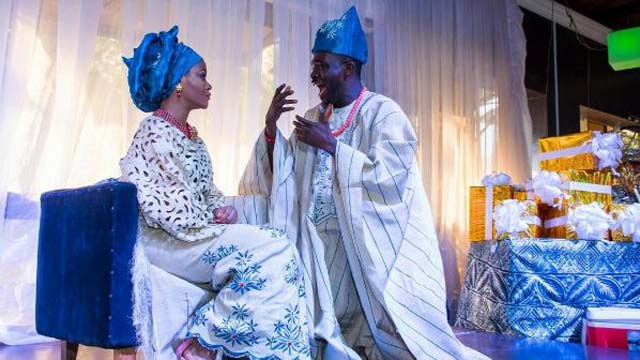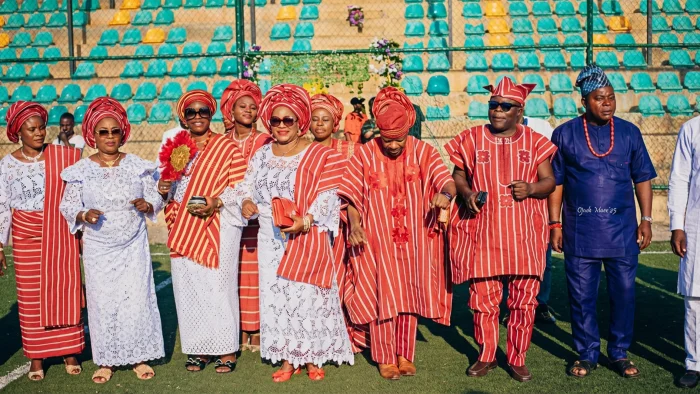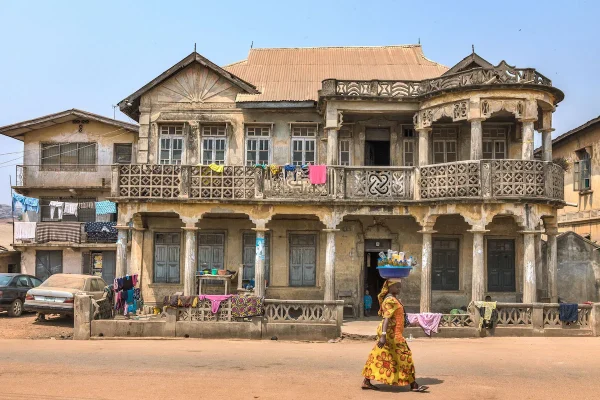
What is the classic definition of marriage in Africa, nay Nigeria? To whom is the woman married – just the husband, or his entire family? What is the bride or wife’s role in marriage? In an era where whether to cook for the husband or not has assumed such a heated topic on social media, what exactly is the role expected of the modern Nigerian woman in a marriage? Importantly perhaps, what is the man’s expectation of his wife? Not least worth considering is, what vibe does a woman perceive from her would-be husband? Is it a partnership of equals or master-servant?
These were some of the core issues that played out at the performance of Joy Isi Bewaji’s Wedding Blues last Sunday on the last day of British Council Lagos Theatre Festival 2017 at Freedom Park. It was produced by Bikiya Graham-Douglas’ Beeta Universal Arts Foundation (BUAF), with Festival Director, Lagos Theatre Festival, Mr. Kenneth Uphopho, directing. It was one of the festival’s main plays, having won the British Council’s Play Writing Competition ahead of the festival. It was designed to nurture a new generation of playwrights, as the art is fast becoming endangered. It was a flurry of dramatic performances on the last day of the festival that brought theatre-lovers and critics from around the world.
Bedecked in her scintillating traditional wedding attire, Temi (Damilola Adegbite-Attoh) is the bride of choice, trained abroad and well exposed. As she sits admiring herself in the mirror with the makeup artist fusing over her, her mind is a boil. Her mother’s joyous singing at the glorious day of her daughter does little to put Temi’s mind at ease. If anything, her mother’s marriage tutorials worsens Temi’s mood and gives her instant headache to which, though everybody desires a great marriage for her, nobody offers her common aspirin.
[ad]
Her mother, Omobolanle (Bola Haastrup), is the dutiful wife, who reels off the duties of a wife to her daughter on her wedding day, about waking up early to sweep, clean, cook and be at the beck and call of her husband at all times and about being subservient to her in-laws so she could occupy a good spot in their hearts. In fact, it’s all about what the bride should do to keep her home and secure her husband. Even Temi’s objections to the tutorials and the place of love in her mother’s checklist is waved off as idle talk. For the mother, being a dutiful wife is all there is to it.
Temi’s mother dismisses the mistreatment she receives from her father, as nothing. Such mistreatment, she says, does not distract her from her duty as a wife!
Temi’s sister (Osas Ighodaro Ajibade) has her own peculiar advice for the bride-to-be. Temi must get pregnant at once; in fact, it has to happen on the wedding night so Temi can secure a strong foothold on her husband’s home so other roving women do not snatch her man from her. She waves off Temi’s objection, preferring instead to pursue a higher degree and career. Temi’s sister is a victim of her husband’s chronic womanising. In spite of having a child for her husband shortly after marriage, her husband went ahead to impregnate another woman. In fact, Temi’s sister is a bitter woman on account of her husband’s infidelity to which she promptly warns her sister to be wary.
Not least in the list of advisers is Temi’s Aunty (Bikiya Graham-Douglas), a radical feminist on the move, who does not see the value in a man beyond occasionally getting one into her bed when she needs to. She is a wild businesswoman, who lives large on her own means and terms; she believes men are a waste of time. She can’t stand their suffocating grip on women unfortunate enough to succumb to the marriage trap and be wives. She prefers to live free from any such encumbrances as a husband. Temi is wide-eyed at her revelations.
Temi’s father Bankole, (Toyin Osinaike) is a vain man, who desperately needs his daughter to properly connect to the rich family she is marrying into. He assures his daughter that having as many sons as possible is a sure way of cornering a large chunk of her husband’s family wealth to herself and him! And by the time he invites the pastor (Paul Morgan) to pray for her daughter marriage success rather than offer her the aspirin she needs to relieve her headache, Temi is confused enough to want out of a marriage yet to hold. She feels unable to play the impossible, burdensome roles she is being expected to play as wife, as they would crush her ambitions in life for which she got education.
But that is when her husband-to-be, Sola (Patrick Diabuah) walks in. Her stern look is cause for concern. When she blurts out to him why she is pulling out of the marriage, Sola, on bended knees, reassures her and allays her fears. Sola tells her he wants a wife to love and not some domestic help to slave for him. Reassured, Temi walks into her marriage with confidence, knowing that her husband will give her the room to be her own woman and live her dreams even as a wife.
[ad]
BEWAJI’S concern in Wedding Blues is the unabating patriarchy tendencies in African, nay Nigerian societies. Should a modern, educated girl (bride and wife) still be dominated by the concerns that plagued her mother, and even grandmother? Should wives still cower before their husbands, a little removed from the status of domestic helps? What kind of space should a wife enjoy in her husband’s home? Are men scaring off women from the marriage tangle because of men’s mean hand that objectifies women? Do men marry for the complementarity reasons or other less noble ones?
Bewaji posits that women these days are not ready to take second place positions and rightly so, too. A union of equals is what women crave and it would be silly for men to continue on the misogynist path. It hasn’t quit led anywhere before; it would lead nowhere now either.
However, Wedding Blues’ plot structure does not build up to that dramatic climax that creates enough anxiety in the audience before its resolution comes. Having been worked up by the anxiety created by her mother, aunty, sister, pastor and father, Temi is scared enough to call off the marriage. But it is only the groom who is made aware of her fears. He is the only one she informs of her decision to call off the marriage. Those who scared her are ignorant of it. Whereas it is they, in fact – her mother, aunty, sister, pastor and father – who ought to be sufficiently thrown in a fainting fit, particularly her mother and father, for daring to call off the marriage. Her parents are more invested in the marriage other than the reasons Temi wants to marry. But they are not made to fret, not even made aware of Temi’s fears; they are spared the trauma of her decision.
That would have been the conflict point before a resolution is attained. Indeed, some audience members were wondering if the play had ended; they still looked forward for more, but it never came. But it is imagined that Wedding Blues is a work in progress and needed adjustments can still be made. But clearly, Bewaji has placed her fingers on a disturbing social situation just as her other play, Story of My Vagina. Indeed, they are both complementary plays that deal with the issues of how men can fully embrace women for who and what they are without punches always being pulled.
[ad]








